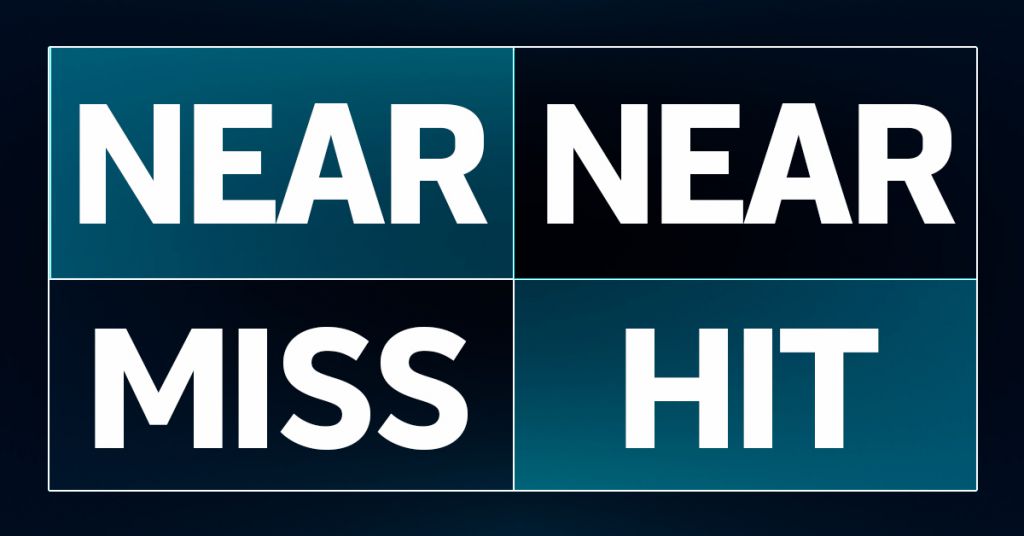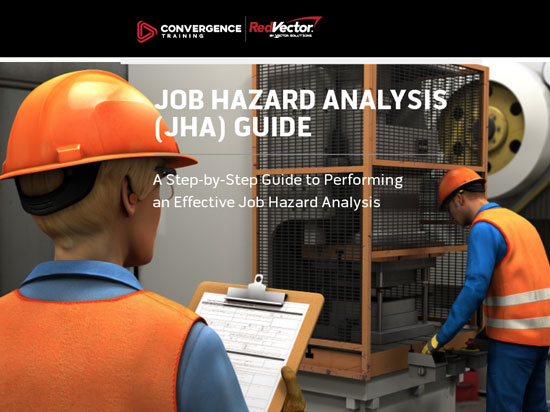
One of the many interesting controversies in safety and health (and quality, etc.) is what to call what many call a “near miss.”
Some say near miss; others say near hit; still others prefer terms like incident, event, and failure. And still other people use other terms.
Some might think it’s a meaningless point or simply a semantic issue. Others think the specific term we use for this is very important, however.
In this article, we provide an interactive, online poll to get your opinion and get the opinion of the larger community as well.
Take a moment, tell us what you think, and see what others think, too.
- Learning Management Systems
- Online Safety and Health Training Courses
- EHS & Safety Management Software
- Mobile Apps for Safety Management and Safety Training
Near Hit v. Near Miss With Some Other Contenders
So what term do you use? Let us know using the poll below.
We DEFINITELY appreciate your having used the poll. And we hope you found having to think about your answer instructive or maybe even seeing how others have answered the question.
But in addition, please use the comments section below to tell us more. Do you use a different term we didn’t include in our poll? If so, let us know what it is. And, equally importantly, why do you prefer one term over the other? Or do you think it’s a tempest in a teapot?
Either way, please use our comments section below to sound off.
Our Online “Near Miss” Training Course
Our production department used the term “near miss” when they created our online training course about best practices for near misses at work. We’ve provided a simple video, below.
Conclusion: Near Miss, Near Hit–Meaningless Semantic Debate or More?
Thanks for using the poll, checking what others have to say, and leaving your comments below (please do!).
We’ll catch up with you again soon. Until then, feel free to download the free Job Hazard Analysis Guide below.

Job Hazard Analysis Guide
Learn how to perform a job hazard analysis on the job with our free step-by-step guide.
Near miss is almost every where, this is a common term used for defining near miss.
Sohail, I agree. It seems “near miss” is the most common phrase for this.
Of course, that leaves open the issue of whether or not it’s the best to use.
I use the term “Deviation” since all Work Instructions and / or Work Procedures follow a logical or linear pattern. When an unwanted event, near miss or near hit occurs it is an indication that there was a deviation in the work/task pattern. Personally I feel that it makes the Root Cause Analysis easier to trace when one knows where a deviation occurred.
Gerhard, your use of “deviation” is similar to “departure from expected outcome,” a term I borrowed from Dr. Todd Conklin’s book “Pre-Accident Investigations.”
I prefer incident as it covers everything and employees don’t feel threatened or blamed. It can still be further defined as injury, lost time equipment damage etc for tracking purposes. By not pointing fingers so much it will encourage reporting so problems are discovered resulting in the ability to handle which should be the ultimate goal.
Good one, Rob, thanks!
near miss is very common in every safety organization. and any safety books and different training..
Zaldy, you’re right, that’s a very common use in industry.
We use Good Catch
Ah, I didn’t anticipate that one. Good one.
Jeffrey, I chose Incident. Folks should treat those Near Misses, Near Hits, or Close Calls as Incidents, and investigate them. I agree it is hard to get away from Near Miss as the term most commonly used. Many organizations are calling them Near Miss Incidents. Near Hit Incidents might be more accurate. I like Mr. Rob Jorden’s point to further classify them with their potential consequences to raise more interest for follow up.
Good points, Daniel.
Would all of you jump off a cliff if everyone else did? There is no such thing as a near miss. In any incident you either do or don’t there is no maybe. You either hit something or are hit by something. A miss is a miss no matter how close. A miss is a zero incident, no injury, no damage. It is a human condition to have the need to title or label something like that. “Near miss” is a misnomer, Wow that was a “close call” or do you say dang that crane nearly missed me or do you say wow that crane nearly hit me. If it doesn’t make sense in a sentence like this than it makes no sense as a two word slogan.
Roger, thanks for the thoughts.
On the issue of the phrase “near miss” being a somewhat illogical combination of words, I think a lot of people agree with you. I think that’s the argument behind switching the phrase to “near hit,” since the person was nearly hit, not nearly missed.
I think some argue that there is value in noting if something nearly happened instead of just seeing it in a black/white, do/don’t, incident/no incident manner, though, with the thought being that if we identify near misses (or near hits), we can see what led to them and perhaps apply some form of corrective action so it doesn’t contribute to a real incident in the future. Thoughts about that?
Hi Jeffrey. In my opinion the context of “Near” in the phrase “Near Miss” does not refer to nearly but rather close. It is not a nearly miss but a close miss. Therefore Near Miss (in my opinion) is the correct terminology.
I totally agree with you Roger. The words “near miss” implies that it was an actual incident and not a close call. I would much rather use close call. I could see an employee coming to my office and saying I had a close call.
I’m glad this little poll still generates interest and discussion (and all through Google organic traffic as well). Fair points, Madeline–thanks for sharing.
An incident is an unplanned event that either results in injury, illness, or damage -or it doesn’t. I use Incident for many of the same reasons given above.
Good call, Pat.
“Dang that hammer near hit me”
That’s poor English. It was a miss and it was near. “near miss”
The nearly hit/missed argument doesn’t work because the phrase is “near” not “nearly”
What do other cultures call it ?
Good question. I don’t know the answer.
There’s a reason we don’t call “life insurance”, “death insurance”. Although it should be called death insurance by definition. People dont like it and so, in order to sell the insurance they called it life insurance.
Its always been called a near miss for the very same reason. People dont like talking about “hits” and so went with “misses”. But, there will always be some people to try and buck the trend. I personally prefer near miss. It feels………… safer 🙂
An argument based on semantics/emotions. There’s some validity to that, I’d say.
I hate the term “Near Miss” even though it is used in all of our safety training. I vote for “Near Hit”. My talent, for whatever reason is catching typos and I caught one with you – “Conclusion: Near Miss, Near Heat–Meaningless Semantic Debate or More?” It should have been Near Hit, not Heat!
Thanks for the comment, John, and good catch on heat/hit!
Well I came to this site in search for what I thought was going to be an easy answer. But Nope – However I did get my answer. The question was [near miss vs near hit] – I thought the accepted term would definitely be near miss. It seems the terms in use are diverse — Near Miss, Near Hit, Close Call, Incident, Deviation, and departure from expected outcome. Wow – I m pretty sure if all of those were on a multiple choice OSHA test any other answer than Near Miss would be WRONG. But There seems to be slant towards the term Near Hit and the professionals on this sight seem to mostly agree that this is the technically better answer than Near Miss. So here is what is going to happen the person that reviewed my program that I wrote made a suggestion to use Near Hit instead of Near Miss – I am going to change everything to Near Hit – Then most everything is a move in a more positive and correct direction and all I needed to do to support that was make a little HIT – Ha Thanks Everyone on to the next project.
Glad you found this little debate interesting, Mike. Cheers.